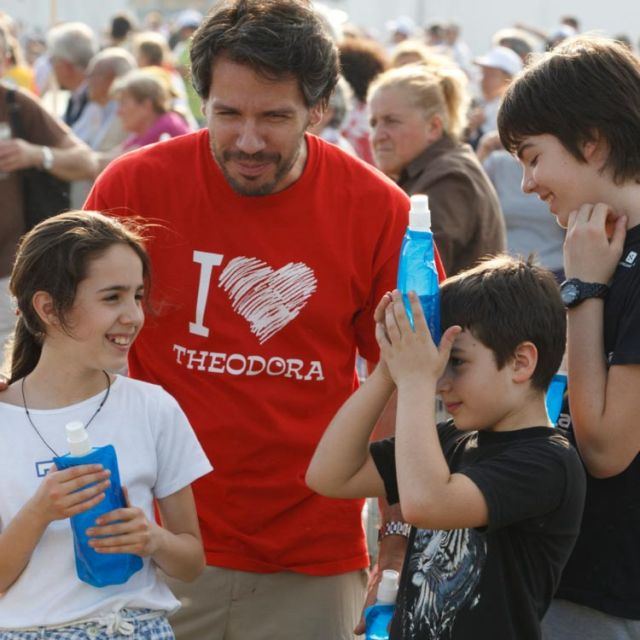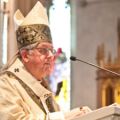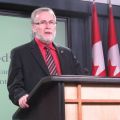Canadian census figures show 'devastating' decline in traditional family
By Deborah Gyapong, Canadian Catholic NewsOTTAWA - Canada's latest census figures showing a continued decline in married-couple families and a hefty rise in lone-parent and common-law arrangements are “sad and worrisome” and “nothing to celebrate,” say pro-family organizations.
Peter Murphy, assistant director of the Catholic Organization for Life and Family (COLF), said the “handwriting is on the wall” as the 2011 census reveals the number of common-law couples has risen 13.9 per cent since 2006 and lone-parent families have increased by eight per cent. The number of children living with married parents declined from 68.4 per cent to 63.6 per cent from 2006 to 2011, Statistics Canada reported in a Sept. 19 release of data on family structures. But when the figures are examined over 50 years, the picture shows a dramatic decline from around 90 per cent of married couple families in 1961. A steep decline began in the mid-1970s.
“Despite an attempt by the media to make ‘diversity’ in family structure seem like a good in itself, when it comes to questions pertaining to procreation and child-rearing the ‘writing’ is inscribed on the human body,” Murphy said in an e-mail interview. “It takes a man and a woman to conceive a child and, as the social sciences have told us repeatedly, it is in the best interest of children to be raised by a man and a woman united in marriage.
“Study after study has found that the advantaged child is the one raised by one woman and one man in a stable, committed relationship,” he said. “This is because God, our creator, has made the union of man and woman fruitful and this fruitfulness is not limited to physical procreation.”
The Institute of Marriage and Family Canada (IMFC) warned the family related data outlines an “alarming trend” that will lead to greater child poverty. IMFC research and communications manager Andrea Mrozek said she was disturbed by the “chirpy” response to the troubling data in the mainstream news media.
Mrozek said the IMFC has shown in its research that family breakdown is linked to poverty — citing the 2006 census which showed 8.2 per cent of married couples were in poverty, according to the Low Income Cut Off (LICO), compared with 16 per cent of lone-parent families headed by men and 32.2 per cent of lone-parent families headed by women.
The media seemed to be applauding the growth of more diverse, progressive family circumstances, she said. The coverage was “superficial” and misses the real story of demographic and family decline that is “devastating” for Canada as a country and for every individual touched by family breakdown, said Mrozek.
Most social science research in the United States has acknowledged that the married couple raising children biologically related to them is the best for children on a range of outcomes from poverty levels to drug or alcohol abuse, trouble with the law, mental health, early sexual activity and future success at maintaining stable marriages themselves, Mrozek points out. This message has not reached most policy advisors in Canada.
COLF agrees the research shows married-couple families raising children biologically related to them have the best outcomes.
“The social cost of equating ‘alternative’ parenting relationships with the traditional family has already had a profoundly negative impact on society,” Murphy said. “To begin with, children raised in non-traditional family structures are statistically more vulnerable to abuse and to developmental and social problems of various kinds. Both the children themselves and society in general end up paying a high price.”
Like Mrozek, Murphy shares concerns Canada’s aging population and dwindling number of working taxpayers make the cost of family breakdown “increasingly difficult to bear.”
“Not surprisingly, in such circumstances, some are already pushing for euthanasia,” he said. “If we are serious about wanting to forestall further societal damage, we need to embrace God’s vision for human sexuality and the human family — the vision so beautifully articulated by Blessed John Paul II in his Theology of the Body.
“Healthy families make for healthy citizens,” he said. “At every level of society, we need to make support for the traditional family a priority.”
Cardinal Collins to open Year of Faith in Toronto
By Michael Swan, The Catholic RegisterTORONTO - From your library to the confessional, from relics to rejoicing, the archdiocese of Toronto has lined up a year’s worth of ways to rediscover faith.
The Year of Faith kicks off inter- nationally on Oct. 11, commemorating the 50th anniversary of the opening of the Second Vatican Council. In Toronto, the year will start with a solemn opening Mass with Cardinal Thomas Collins at St. Paul’s Basilica on Oct. 14. All 223 parishes in the archdiocese are being encouraged to send representatives, particularly their RCIA catechists, youth leaders and parish council members, to the 4 p.m. Mass at the downtown basilica.
Collins will also dedicate this year of lectio divina programs to a biblical understanding of faith.
The Office of Formation for Discipleship wants to add the Catechism of the Catholic Church to your reading list. And they hope to introduce young people to the Compendium of the Social Doctrine of the Church and the YouCat youth catechism produced for World Youth Day in Madrid in 2011.
“Exploring the Catechism: Faith Alive!” is an eight-part series, and the catechism-based six-part series “Basic Teachings of the Catholic Church” will be promoted in parishes by the Office of Formation for Discipleship. A Fr. Robert Barron 10-part video series called Catholicism will also be available.
The Office of Catholic Youth will run catechetical events based on the Compendium of the Social Doctrine of the Church and YouCat.
A chance to visit with martyrs and saints will be coming to many parishes. Relics of 17th-century Jesuit martyrs from the Martyrs’ Shrine in Midland, Ont., and of St. Br. André Bessette from St. Joseph’s Oratory in Montreal, will tour the archdiocese.
On Oct. 21 seven blesseds will become saints, including Blessed Kateri Tekakwitha, the Lily of the Mohawks. The canonizations will happen in Rome. Parishes are being encouraged to organize events to celebrate Canada’s first aboriginal saint.
Penance will lead local Catholics to faith with the all-day confessions event called “Return to Me With All Your Heart.” The program will be offered in many parishes during Lent.
“The renewal of the Church is also achieved through the witness offered by the lives of believers,” Pope Benedict XVI wrote in his October 2011 announcement of the Year of Faith, Porta Fidei. “By their very existence in the world, Christians are called to radiate the word of truth that the Lord Jesus has left us.”
St. Raymond's gets an Olympic thrill with soccer star Melanie Booth
By Evan Boudreau, The Catholic RegisterTORONTO - Students at St. Raymond's Catholic School got a taste of Olympic glory on Thursday morning when bronze medallist Melanie Booth paid a visit to the Toronto school.
Booth, a defender on the pitch, was a member of Canada's national women's soccer team that captured the hearts of Canadians when the squad captured bronze in London this summer. The Burlington, Ont., native has also been a member of the silver-medal winning team at the FIFA U-19 Women's World Championship in 2002, finished second at the 2006 Peace Queen Cup and took home gold at the 2011 Pan-American women's soccer tournament all while donning the maple leaf.
Booth was thrilled to share her medal with the St. Raymond's students.
"It's probably one of my favourite things about this Olympic medal, being able to share it and to just see the joy and excitement that everybody has when they do see it," said Booth. "Still I think I'd rather be out on the field than talking to people."
Nervous as she is about public speaking, Booth gave one message she feels young students need to hear — even if it means sweating in the spotlight for a little bit longer.
"Just never give up. You're going to have to many roadblocks in the way, people telling you you can't do things, injuries, other things that will hold you back. But if you really believe in yourself and you really want to go for your dream just never give up."
"I'm excited to have her here because she represented our country in the Olympics and I really like soccer," said Vanessa Ferreira, 10. "It teaches you that you can do anything. It's hard to go inside the Olympics but if you try hard you can do anything."
Along with fellow Grade 6 student Debbie Dias, Ferreira was selected to write and read a letter of thanks to Booth for taking the time to stop by their school.
"We were chosen to represent our school by saying thank you to somebody who is representing our country and who is a great athlete," said Ferreira. "It's an honour."
St. Raymond's was one of 10 schools from across the Toronto Catholic District School Board selected to host an Olympian or Paralympian on Sept. 20. It was part of a three-day celebration, from Ottawa to Toronto, for many of the athletes who represented Canada at the London Olympics. The three days included a trip to Parliament Hill, school and hospital visits and was to be capped off with a parade through downtown Toronto on Friday and a public celebration of the Olympians.
"It's such an honour and especially after watching the news yesterday and seeing how the Prime Minister also acknowledged their wonderful gifts of sportsmanship to Canada," said Anne Marie Verre, St. Raymond's principal. "To see a female soccer hero coming is a wonderful role model especially for my young girls, but also for the boys of course."
Finding out their guest's identity just 24 hours earlier left little time for Verre and the students to prepare, although you'd never have guested it walking into the gymnasium.
"We immediately went onto the Internet and searched Melanie Booth and some exciting facts about her ... and we posted it throughout the school so the children realized that this person is actually coming here," said Verre. "So the children could (then) get an idea of who she was simply by walking through the halls."
This preparation, short as it may have been, gave the students at St. Raymond's the ammunition they needed to bombard Booth with questions, autograph requests and photo shoots — excitement she enjoys almost as much as being on the field.
CCAS funds dreams and ambitions for former foster kids
By Michael Swan, The Catholic RegisterTORONTO - When 21-year-old Tia McGregor sees the younger kids who like her have grown up in foster homes — kids who have to figure out life without a family to support them the day they turn 18 — she tells them to follow their highest ambitions and their most cherished dreams.
"Do what you love and the rest will follow," she says.
The fourth-year Queen's University drama student knows her message is pretty hard to take seriously when you're 18 and have just been kicked out of your foster home.
"It didn't help me when people told me," she said. "For youth in care, there is so much more you have to think about."
Most former foster kids think they can't afford ideals, dreams and ambitions, said McGregor. They've got to worry about the rent, groceries, tuition. They've got to walk the tight-wire of daily life without the safety net of a family.
McGregor attended her third annual Hope For Children Foundation awards dinner Sept. 19 at Hart House on the University of Toronto campus. She collected a $2,000 scholarship to help with another year of post-secondary education. In total, the Hope For Children Foundation gave out $140,000 this year in scholarships to Catholic youth who had been through the foster care system with Catholic Children's Aid Society of Toronto.
One-hundred-six young people collected scholarships this year in amounts of $1,500 for community college students and $2,000 for university students.
For these kids the scholarships are a very small part of their financial picture, said Catholic Children's Aid executive director Mary McConville.
"We wish it was more," she said.
Statistics Canada released a study Sept. 12 showing the average Ontario undergraduate pays $7,180 in tuition fees alone. Since 2006 Ontario tuition fees have increased by a cumulative 71 per cent, said the Canadian Federation of Students — Ontario. Add in modest living costs, books, transportation and the real cost of an academic year is more like $11,000, according to the Hope for Children Foundation.
But still, the high-achieving McGregor urges idealism and big dreams on younger foster students. A high school math and science whiz, McGregor began university in astrophysics, trying to pursue the safe science career people expected of her. She wanted to study a little theatre on the side, but chemistry got in the way of a drama minor.
"In the end, I couldn't lie to myself," she said.
She switched programs despite the expectations of her foster family and former high school teachers, because the alternative to following a dream is grim and lifeless. She's blossomed as a writer, comedian and actress and spent last summer with the Thousand Island Playhouse summer theatre program acting and leading writing workshops for high school students.
None of this success was built into McGregor's beginnings. Her mother discovered she was pregnant at 15, and because the father was black the family rejected their daughter and granddaughter. McGregor's mother developed a drug addiction and her father was mostly absent. At six McGregor took refuge at her best friend's house every day and then every night.
Eventually that best friend became McGregor's foster sister and by the time she was eight the neighbour family officially became her foster home. Soon afterwards, McGregor's foster family moved from Scarborough two-and-a-half hours' drive east to Campbellford, Ont.
Small-town life was stable, warm, accepting — all she could have asked for. Unlike many foster children, McGregor stayed in the same home until she went away to university.
But she never had to look far to see how much more difficult things could have been. One of her foster sisters turned 18 last year before graduating from high school. Under Ontario law foster children are no longer crown wards at 18 and must immediately move out. McGregor's foster sister found a place with a school friend 45-minute's drive from her school. The 18-year-old managed to finished high school despite the dramatic dislocation and is now attending college.
McGregor believes the things she's experienced and seen in her life as a foster child have done more than toughen her up for life. They've also made her a better writer.
"I have more life experience, maybe," she said. "And that makes for a good writer."
Refugee groups want bishops to grill Kenney
By Michael Swan, The Catholic RegisterTORONTO - When Immigration Minister Jason Kenney walks into a room full of bishops in St. Adéle, Que., Catholic refugee agencies are hoping the minister gets an earful.
Five Catholic immigration and refugee organizations in Toronto have written to the bishops asking that they challenge the minister on changes to Canada’s refugee and immigration laws. Kenney will address the bishops between Sept. 24 and 28 in a private, off-the-record session at the Canadian Conference of Catholic Bishops’ annual plenary meeting.
Romero House, Sanctuary Ministries of Toronto, FCJ Refugee Centre, The Mustard Seed and Becoming Neighbours want the bishops to ask Kenney:
o Why Canada is treating refugees from some countries differently than refugees from other countries?
o Whether it’s fair to rush certain cases through the system before refugees hire a lawyer and prepare a thorough case?
o Why the government is limiting basic health care for refugees?
o Why do so many of Canada’s 200,000 foreign workers have no stable pathway to permanent resident status?
o Why are refugees smuggled into Canada as a group blocked for five years from re-uniting with their families even if they are found to be legitimate refugees?
The CCCB won’t say whether these questions will be asked, but it has the potential to re-open an old feud between the bishops and Kenney. In November 2010 the bishops’ Justice and Peace Commission wrote to Kenney to complain of sections of “The Balanced Refugee Reform Act and the Maritime Transportation Security Act.”
“Many of the clauses of this legislation may contravene international law and Canadian law, and penalize refugees more than the smugglers,” said the CCCB letter, adding that his anti-smuggling bill “risks creating serious obstacles to sponsorship and family reunification.”
Kenney did not welcome the bishops’ criticism, telling Canadian Catholic News Ottawa correspondent Deborah Gyapong the letter reflected a “long tradition of ideological bureaucrats who work for the bishops’ conference producing political letters signed by pastors who may not have specialized knowledge in certain areas of policy.”
Romero House director Sarah Villiger hopes this approach to Kenney through the bishops will draw a warmer response.
“We knew that (Kenney) would be there, personally invited. I think that in itself is a bit of a different tone, as opposed to just writing him a letter,” she said.
In part, the refugee agencies wanted to remind the bishops of their own stand on refugee and immigration issues. The letter quotes the bishops own 2006 pastoral letter “We Are Aliens and Transients Before the Lord, Our God.”
“Openness should be shown to persons of all cultures and origins, no matter their immigration status. Christians are to be among those who refuse to let injustice toward migrants continue, let alone increase,” the bishops wrote.
“We thought it was important that they get the input of people who work on the ground with refugees,” said Villiger.
The organizations also took the opportunity to remind the bishops of the many refugees and immigrants who actually occupy pews on Sunday morning.
“The Canadian Catholic Church has historically been an immigrant Church, and today many of the Catholic faithful are immigrants and refugees who form a vital part of and make a significant contribution to the Church in Canada,” they wrote.
Miller calms conflict within pro-life movement
By Deborah Gyapong, Canadian Catholic NewsThis article was amended on Sept. 24, 2012 to clarify comments made by Jim Hughes.
OTTAWA - A statement by Vancouver Archbishop Michael Miller that supports Catholics who campaign for “gestational legislation” to limit abortion has helped calm growing tensions within the pro-life movement.
Miller wrote it is “morally licit” for Catholics to support legislation that sets limits on abortion rather than immediately banning it outright. The archbishop’s statement, quickly endorsed by Toronto’s Cardinal Thomas Collins and posted on the Canadian Conference of Catholic Bishops’ (CCCB) web site, urges co-operation in the pro-life movement but stresses: “Co-operation does not always mean unanimity regarding a given strategy; open and civil debate about the wisdom of any specific strategy is healthy.”
Over the past year, support in pro-life circles across Canada has grown for a law that would prohibit abortion at later stages of pregnancy or gestation. Campaign Life Coalition, the national political arm of the movement, however, has remained staunchly opposed as have several other groups that believe incremental legislation of this type will not result in an eventual ban on abortion.
Each side has accused the other of not being Christian or Catholic enough — either for not protecting those babies that might be saved through some restrictions on abortion, or for not sending a strong enough message about the value of all human life from conception.
But Miller said that both positions, for or against gestational legislation, are morally licit.
Miller wrote it is acceptable to support gestational legislation (i.e. legislation that would allow abortion in the early weeks of the unborn child’s development) as an incremental step that would reduce the harms of “an unjust legal regime that permits abortion.” But such law should be regarded “as a step along the way to the eventual full legal protection of the right to life of all unborn human beings.”
“At the same time, it is also morally licit to withhold support for gestational legislation — and other incrementalist legislative strategies intended to limit access to abortion — if, after prudent reflection, one is convinced that it is an unwise legislative strategy,” he said.
The Catholic Organization for Life and Family (COLF), co-sponsored by the CCCB and the Supreme Council of the Knights of Columbus, welcomed Miller’s intervention.
“The division within the pro-life movement is very preoccupying, especially when leaders and members of pro-life groups point at each other and criticize each other’s approach to protecting the unborn,” said COLF director Michele Boulva. “All this hinders our chances of obtaining a law that would protect the most vulnerable of Canadians — its unborn citizens.”
She applauded the bishops’ taking leadership in the pro-life arena.
“As Catholics it is essential that we turn to our bishops when confusion arises regarding the Church’s teaching. Christ has empowered them to teach in His name.”
Based on Blessed John Paul II’s teachings in Evangelium Vitae, “legislation which intends to limit the harm done by a pro-abortion law is not itself co-operation with unjust law but rather ‘a legitimate and proper attempt to limit its evil aspects,’ ” the archbishop wrote.
The absence of any law restricting abortion in Canada is a “de facto legal regime that permits abortion with almost no restrictions,” the archbishop said.
“Legislation intended to restrict access to abortion would not create a new legal situation in Canada which would authorize abortions, but instead would intend to limit the number of abortions already authorized under law,” he said.
He also reiterated Catholic teaching against abortion at any stage, noting that “no law can claim to legitimize abortion.”
Two major pro-life groups on either side of the issue welcomed Miller’s statement.
Campaign Life president Jim Hughes said the archbishop makes it clear we have a de facto law by having no restrictions on abortion.
“I thought Archbishop Miller laid the case pretty well,” he said. "Although I and many others would not necessarily agree with his opinion on a de facto law.”
The most important part of his statement “points out that gestational legislation may or may not be the way to go,” said Hughes, who remains wary of the gestational legislation approach.
Priests for Life Canada is among the many pro-life groups that would support gestational legislation. Priests for Life board chairman Fr. John Lemire, a parish priest based in New Liskeard, Ont., said he is pleased the archbishop’s statement has “supported the idea that a Catholic, a Catholic politician, can in good conscience support gestational legislation.”
The archbishop’s letter may have helped shore up some of the unity within the pro-life movement that has been fragile since its inception, Hughes said. The movement is made up of political, educational and pastoral groups that counsel and support mothers with unexpected pregnancies.
“Campaign Life Coalition has been accused of being ‘all or nothing’ and that’s not true,” Lemire said, noting that since its first questionnaire in 1978, it has “always had an incremental question as part of its strategy.”
The key, said Hughes, is in the wording of any legislation.
“I’m not in favour of ‘we need any law,’ ” Hughes said.
He is opposed to the gestational approach because the experience of countries with gestational laws in place have “so many exceptions” the laws are “virtually useless.” There are many other forms of incremental legislation that would restrict abortion — such as defunding it, or informed consent laws, that Campaign Life would support, he said.
“As the political branch of the pro-life movement we have been battling over 30 years,” he said. Campaign Life has also worked closely with counterparts in other countries who have said “gestational limits are not the way to go.”
Hughes’ objection to gestational legislation extends beyond doctrinal concerns to practical matters, he said. Campaign Life has focused on identifying and supporting individual pro-life candidates in both the Conservative and Liberal parties at the grassroots level. He noted that there are presently 60 pro-life MPs in Parliament. A gestational bill would not have the votes to pass, he said. In addition, Prime Minister Steven Harper remains unwilling to reopen the abortion debate.
Hughes said momentum on the issue has been shifting towards the pro-life movement, but a focus on gestational legislation risks sidetracking it.
The role of the Priests for Life, Lemire said, is to work with all the groups, to “try to be a bridge builder and bring about some dialogue and conversations” not only among groups but with bishops and people in dioceses.
That does not mean Priests for Life agrees with every tactic, he said. But he stressed people who might not be comfortable in an activist role could be great counselling a young expectant mother, or doing any number of tasks that need to be done to create a culture of life.
Canadian bishops throw support behind Motion 312
By Deborah Gyapong, Canadian Catholic NewsOTTAWA - The Canadian Conference of Catholic Bishops (CCCB) issued a Sept. 18 statement affirming support for the sacredness of all human life from conception to natural end as Motion 312 comes to its second and final hour of debate in the House of Commons.
Conservative MP Stephen Woodworth's private member's motion would review the Criminal Code's definition of a human being in the homicide section that declares: "a child becomes a human being within the meaning of this Act when it has completely proceeded, in a living state, from the body of its mother."
The statement was signed by CCCB President Archbishop Richard Smith. It is posted on the CCCB web site (www.cccb.ca) and provides a link to Motion 312's text.
"The Catholic Church holds that a human being comes into existence at conception," Smith says in the statement. "The lives of human beings are, therefore, sacred at every stage in our existence — from beginning to natural end.
"As the House of Commons prepares to debate Motion 312, the bishops of Canada invite all members of the Parliament of Canada to take into full account the sacredness of the unborn child and each human life. We also encourage Canadian Catholics, and all people of good will, to pray that our legislators be blessed with wisdom and courage to do what is best to protect and further the common good, which is based on respect for the human dignity of all."
MP Woodworth makes final pitch on Motion 312
By Deborah Gyapong, Canadian Catholic NewsOTTAWA - Conservative MP Stephen Woodworth told journalists Sept. 17 his Motion 312 is not about abortion but whether Canada has lost its consensus on inalienable human rights and honest laws.
Woodworth admitted his private member’s motion has little chance of passing when it comes to a final vote Sept. 26 because the Prime Minister and chief government whip are on record that they will not support it because of promises they’ve made not to reopen the abortion debate.
On the opening day of the fall session of Parliament, Woodworth said Motion 312 “has much more important consequences than the abortion issue.” At stake is whether Canada has lost a consensus that the dignity and worth of every human being must be recognized, that rights are inalienable rather than granted by the government, that rights cannot be taken away through laws that deny basic human rights to a class of people by dehumanizing them and that laws must be honest, he said.
Motion 312 would strike a parliamentary committee to examine the 400-year-old definition of a human being in the Criminal Code’s homicide section concerning unborn children. For the purposes of the law, an unborn child is not a person with human rights until he or she leaves the birth canal. The committee would investigate whether this definition holds up in light of scientific evidence.
His motion specifically states the findings of the committee could not go against any Supreme Court of Canada decisions or the Constitution when it comes to women’s rights, he said.
Supreme Court Justice Bertha Wilson, who wrote the Morgentaler decision, was concerned about the rights of the unborn in later stages of pregnancy and left it open for Parliament to craft a law protecting them, and the courts have not closed the issue, he stressed.
Woodworth explained the motion, if passed, could undertake an investigation that may or may not settle the issue of when an unborn child is a human being.
“Even settling the issue of when a child should be a human being will not settle the issue of abortion,” he said.
Woodworth said one of the options of the committee could be to decide an unborn child is not a human being. His motion, however, is about universal human rights and he hoped the second hour of debate Sept. 21 would bring out that aspect.
Woodworth said he has been accused of “wanting to back to the Middle Ages,” or of opening issues that were settled by the courts. Opponents never talk about what his motion actually says, Woodworth said. No one has disagreed with the suggestion that unborn children might be human beings before birth.
“The first distraction is to talk about me, my character, my motives,” he said.
Tens of thousands of people have written their MPs in support of the motion, he said. And on Sept. 18, about 60 mainly religious and pro-life groups signed and sent a declaration in support of the motion to MPs. Among the 60 groups to sign “The Declaration of Support for Parliamentary Study of Canada’s Legal Definition of ‘Human Being’ ” were the Catholic Organization for Life and Family, the Knights of Columbus, REAL Women Canada, the Evangelical Fellowship of Canada and various evangelical churches.
After the news conference, journalists scrummed NDP Justice Critic Francoise Boivin who said the debate on abortion is closed. She pointed out Prime Minister Stephen Harper has taken the same view and Canadians have reached a consensus. The legal definition of a human being sees the pregnant woman as one person, not two, for the purposes of the law.
Surveys have consistently shown about two-thirds of Canadians would like some law restricting abortion.
Ukrainian Catholic bishops close synod with gala, challenges
By Catholic News ServiceWINNIPEG - Ukrainian Catholic bishops from four continents gathered for a final celebration Sept. 16 as they closed their weeklong Synod of Bishops.
One of their emphases was on the role of the laity, and the final "gala," as it was billed, included the Hoosli Ukrainian Male Chorus, an honour guard and the Selo Ukrainian Dancers.
Archbishop Sviatoslav Shevchuk of Kiev-Halych, the elected head of the Ukrainian Catholic Church, challenged his audience of 800 to live Christian life to the fullest and not as "lukewarm, nominal Christians."
"If we allow ourselves to be overcome so we don't pray or enter into liturgy, we will cease to be a Church," Shevchuk said. "We are called to be people of prayer, gasping for the air of the Holy Spirit.
"Sometimes our churches are more like Ukrainian museums. We need vibrant parishes, a place to encounter the living Christ. May our encounter today fill us with new faith, energy and perseverance."
Reinvigorating Ukrainian parishes is part of Vision 2020, the long-range pastoral plan for the Ukrainian Catholic Church, which was suppressed for decades under Soviet rule.
After an opening Divine Liturgy in Winnipeg Sept. 9, the 38 bishops in attendance moved to Portage La Prairie, a city of about 13,000 west of Winnipeg. Focusing on the theme "The Role of the Laity in the Life and Mission of the Church," they heard presentations and reports before breaking into smaller thematic groups.
A statement issued at the end of the synod said the bishops acknowledged the role of the laity in preserving the faith when the Church was suppressed in the 20th century, and they issued a pastoral letter to the laity; it was not immediately available in English.
"The laity must be collaborators with the bishops and priests in pastoral work and, with their giftedness and by their talents, contribute toward the building up of the body of Christ," the statement said.
The bishops proclaimed a patron of Ukrainian Catholic laity: Blessed Volodymyr Pryjma, a choir director from the parish of Stradch, Ukraine, who in 1941 was tortured and murdered by Soviet paramilitary agents in a forest after taking Communion to a sick woman with his priest.
They also pledged to support Ukrainians who have emigrated from their home country.
Bishop Borys Gudziak, newly named bishop for Ukrainian Catholics in France, Belgium, Netherlands, Luxembourg and Switzerland, told Catholic News Service before the synod began that in the last 18 years, Ukraine has lost up to 15 per cent of its population to emigration.
"People have been leaving in droves," he said, noting that, in many countries, the Ukrainians are illegal and living on the margins of society.
Gudziak was one of four bishops elected to the permanent synod for the next five years. Others were Archbishop Volodymyr Vijtyshyn Ivano-Frankivsk,
Ukraine; Bishop Ken Nowakowski of New Westminster, B.C.; and Bishop Jaroslav Pryriz of Sambir-Drohobych, Ukraine.
Next year's general Synod of Bishops will be Aug. 11-13 in Kiev, Ukraine, and will have as its theme the new evangelization.
Forgiveness can change the world as we know it
By Michael Swan, The Catholic RegisterTORONTO - Nobody disputes that forgiveness is the right thing to do, or that it might sometimes be difficult. Immaculée Ilibagiza has much more than that to say about forgiveness.
The Rwandan genocide survivor and best-selling author believes forgiveness can be the basis of our society — the foundation for a different kind of politics, a better sort of media, a more purposeful economy, higher ideals in education, stronger families and a new world order.
“It’s about understanding that forgiveness is peace. Peace starts in the heart. It starts in the family. It comes to the country,” Ilibagiza told The Catholic Register.
Ilibagiza will be at the Marylake Our Lady of Grace Shrine in King City, Ont., Sept. 28-29 to tell her story and nudge the audience into a deeper understanding of forgiveness.
Ilibagiza’s story of survival in the midst of the 1994 Rwandan genocide is as raw and inspiring as any. She and seven other women spent 91 days in silence hiding in a bathroom at the church rectory. She began those 91 days as a 52-kliogram (115-pound) 24-year-old surrounded by family everywhere she went. She emerged just 30 kilograms (65 pounds) as one of the last surviving Ilibagizas. Only one brother, who happened to be abroad during the orchestrated massacre of 900,000 Rwandan Tutsi and Hutus judged too friendly with Tutsi, survived.
In the cramped bathroom, Ilibagiza had a Bible, a dictionary and a rosary her father had given her. With the Bible and the dictionary she learned English. With the rosary she deepened her relationship with Mary.
Outside the church yard she confronted a man armed with a machete — the same man who killed her mother and a brother. She said to him, “I forgive you.”
In the aftermath of the genocide, Ilibagiza worked for the United Nations and eventually moved to New York to work at United Nations headquarters. She would quietly tell her story to co-workers and friends, but it wasn’t the sort of story that could stay quiet.
Eventually she wrote Left To Tell: Discovering God Amidst the Rwandan Holocaust. No ordinary venture into religious publishing, Left To Tell became a New York Times best seller, has been translated into 15 languages and has been added to the curriculum for thousands of high school and university students around the globe.
By now, Ilibagiza has told her story hundreds of times. DVDs of her retreat talks sell online and she’s signed a contract with MPower Pictures to transform her story into a feature film. But the 42-year-old mother of two continues to be surprised by the effect her story has on audiences.
“I’m really more amazed by what people take from my story,” she said. “What people take is that forgiveness, in such a magnificent way, is in their hearts.”
Ilibagiza has been confronted with many audience members who, either at the end of her talk or weeks later, discover a capacity to forgive husbands, wives, parents, children, brothers and sisters. But Ilibagiza also emphasizes how personal and intimate acts of forgiveness within families and among friends can begin a process that reaches beyond that immediate circle.
The touchstone of Ilibagiza’s talks is the spirituality of the rosary. She has written a book about the apparition of Our Lady of Kibeho, a recognized Marian apparition from the early 1980s in a small town in Rwanda. The apparition included a vision of men with machetes and a warning about the dire consequences of turning away from God.
The economic and social implications of reconciliation and forgiveness are on display to the world in Rwanda today, Ilibagiza said. The number of universities and university enrollment have skyrocketed since the genocide. The economy is growing at eight per cent yearly and Africa’s most densely populated and deeply divided nation is discovering a new sense of citizenship that transcends ethnic identity, she said.
“People are building now more than ever, because they learned a lesson,” said Ilibagiza. “My reason to forgive is that I finally came to understand that people can change, people can learn, people are smart.”
Ilibagiza has taken her gospel of forgiveness to the Vatican and an audience with Pope Benectict XVI. She met with the Pope at the end of his Angelus address Sept. 4. She found the experience overwhelming.
Tickets to Ilibagiza’s talk at Marylake are $50 for general admission or $100 for reserved seating, a reception with her and a signed copy of Left To Tell. Call (905) 833-5368 or visit www.luvn4gve.ca.
Bringing safety to troubled marriages
By Michael Swan, The Catholic RegisterBRAMPTON, ONT. - Catholic social workers in Brampton and Mississauga have found a new way to stand up for marriage by standing with as many allies as they can find.
Catholic Family Services Peel-Dufferin, a Catholic social work agency at the service of all families in the suburbs west of Toronto, is the lead agency for the Safe Centre of Peel, a family justice centre in the William G. Davis Centre for Families in Brampton.
“As Catholics, we can’t be afraid to lead,” said Mark Creedon, executive director of Peel-Dufferin Catholic Family Services.
Creedon has pulled together eight critical agencies that serve women and families faced with violence. Rather than being referred from one location to another to obtain housing, counselling, legal aid, medical advice, child care and more, at the Safe Centre it all happens in the same place. The idea is to deliver more effective and timely help and prevent women from giving up hope and returning to life with their abuser.
“Our purpose (at Catholic Family Services) is to preserve true marriages,” said Creedon. “If somebody goes into a marriage thinking his wife is his punching bag, well that’s not really a marriage.”
The Brampton Safe Centre isn’t the first Canadian family justice centre led by a Catholic agency. The former Catholic family services agency in Kitchener-Waterloo, now known as Mosaic, took the lead in establishing the Family Violence Project of Waterloo Region in 2006.
The idea of pooling and co-ordinating services to battered women in a single location started in San Diego, Calif., in 2002. Former City Attorney Casey Gwinn brought together police and social work agencies to form a united child abuse and domestic violence unit. To date, Gwinn’s National Family Justice Alliance has fostered and encouraged 80 family justice centres in the United States and 30 internationally from Amman, Jordan, to Sonora, Mexico.
“The fundamental issues are the same whether you’re in Canada, Mexico, Europe or anywhere else in the world,” Gwinn told The Catholic Register.
In the case of Canadian centres, having religious agencies lead the conglomerate of services is an advantage, he said.
“That spiritual care piece does make the Canadian model more vibrant. We struggle in the United States to get the spiritual care piece addressed in family justice centres,” he said.
Though it’s a Catholic agency that acts as landlord and instigator at the Safe Centre of Peel, the centre is able to connect clients with spiritual care for people of all faiths. The other agencies may not be Catholic, but they share values and a common purpose with Catholic Family Services, said Creedon.
“We’re dealing with excellent partner agencies that have great values which we share,” he said.
While Creedon has been able to get most of the critical services to buy in, he has struggled to get Peel Regional Police onside. The police are part of the Safe Centre’s steering committee and have worked out a protocol for getting victims from the Safe Centre to the police station. But they refuse to station officers already dedicated to domestic violence cases at the centre.
Peel Police claim their “best practice business model” involves working with the Safe Centre of Peel, but “does not involve the permanent stationing of officers within the facility,” Staff Sergeant Rob Higgs told The Catholic Register in an e-mail.
“It’s very shortsighted for law enforcement to say, ‘Oh, this isn’t really our thing,’ ” said Gwinn. “Law enforcement officers around the world are realizing they can’t do the job alone. They’re never going to arrest their way out of the problem.”
Peel Police responded to 2,042 criminal intimate relationship incidents in 2011 and another 6,554 verbal domestic occurrences. Overall, domestic calls in Peel have increased 13.99 per cent between 2008 and 2011, according to Higgs.
The more police come to the house and do no more than record the incident or negotiate temporary quiet, the more abusive men feel the law won’t touch them, said Gwinn.
“Empowered batterers are more likely to fight with police officers. Empowered batterers are more likely to kill police officers,” said Gwinn.
The repeat visits also cost taxpayers hundreds of thousands of dollars in police resources that don’t produce convictions, said Gwinn.
Creedon would like to persuade police to station officers at the Safe Centre, but for now hopes working effectively with police will convince the next chief to assign officers to the centre.
Getting this right is about much more than saving the police budget or getting more convictions. For Creedon, it’s about changing the direction for the next generation.
“One of the things we know about domestic violence is how much it is a generational thing,” he said. “So if you grow up in a family where your mother is getting abused — or it could be the father, but somebody is getting abused in that family — you are three times more likely to grow up to be an abuser or to be abused.”
Nationally the scale of the problem is immense. In 2007 there were more than 40,000 incidents of spousal violence reported to police, about 12 per cent of all police-reported violent crime in Canada, according to Statistics Canada. Women were the victims 83 per cent of the time.
“I totally believe there is something about being a Catholic family service agency that following the Catholic social justice values forces us to not walk away when we see tremendous injustice,” said Creedon.











